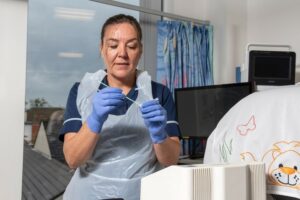A ground-breaking genetic test that could prevent critically ill newborn babies going deaf if treated with gentamicin, a commonly used antibiotic, is being trialled across 14 NHS neonatal (specialist newborn) units across England, Scotland, Wales and Northern Ireland.
Developed by researchers at Saint Mary’s Hospital, part of Manchester University NHS Foundation Trust (MFT) and The University of Manchester, in collaboration with Manchester-based firm genedrive Plc, the rapid bedside test could save the NHS £5 million every year by reducing the need for interventions, such as cochlear implants.
The innovative test was first piloted at Saint Mary’s Hospital and Liverpool Women’s Hospital, in 2020 as part of the Pharmacogenetics to Avoid Loss of Hearing (PALOH) study. Following its success, the test was implemented into routine clinical practice at Saint Mary’s Hospital in 2022 and extended to all three maternity units at MFT, Saint Mary’s Hospital, Wythenshawe Hospital, and North Manchester General Hospital, in 2023.
The National Institute for Health and Care Excellence (NICE) conditionally recommended the genedrive test for use in the NHS last year. It has since been implemented into routine clinical practice at all eight Greater Manchester neonatal units, with funding from Health Innovation Manchester (HInM). So far, the test has prevented the hearing loss of 11 babies at MFT and across Greater Manchester, with 4,000 babies tested to October 2024.
As part of its recommendation, NICE identified areas requiring more information to determine whether the test should be recommended for use at all neonatal sites across the NHS. This includes how the test impacts the time it takes for a baby to be given antibiotics, how the results affect antibiotic prescribing decisions, and the technical performance and accuracy of the test.
Now, having successfully received £1.4m funding from the National Institute for Health and Care Research (NIHR) and the Office for Life Sciences, researchers at MFT will lead PALOH-UK, a new two-year study across 14 neonatal units, from large intensive care units to small special care baby units.
 Dr John McDermott, Clinical Geneticist at MFT and joint lead for the PALOH-UK study said: “We are incredibly proud to be leading this research at MFT, having already seen the difference this new genetic test has made across Greater Manchester. We are excited to explore how it can be used effectively at other neonatal units across the UK.
Dr John McDermott, Clinical Geneticist at MFT and joint lead for the PALOH-UK study said: “We are incredibly proud to be leading this research at MFT, having already seen the difference this new genetic test has made across Greater Manchester. We are excited to explore how it can be used effectively at other neonatal units across the UK.
“The PALOH-UK study will demonstrate how the test can be used in a timely way to ensure babies get a safe, effective antibiotic without affecting normal clinical practice, on a much larger scale.”
The genetic test
 Using a cheek swab, the test can identify in 26 minutes whether a critically ill baby admitted to intensive care has a gene change that could result in permanent hearing loss if they are treated with a common antibiotic, gentamicin.
Using a cheek swab, the test can identify in 26 minutes whether a critically ill baby admitted to intensive care has a gene change that could result in permanent hearing loss if they are treated with a common antibiotic, gentamicin.
While gentamicin is used to safely treat approximately 100,000 babies a year, one in 500 babies carry a gene change that can result in permanent hearing loss when given the drug.
The test replaces a previous method that traditionally took several days and is the first use of a rapid point of care genetic test in acute neonatal care. Babies found to have the genetic variant can be given an alternative antibiotic within the NICE recommended ‘golden hour.’
The 24 month, PALOH-UK study, due to start in November 2024 will be co-led by Professor Bill Newman, Consultant in Genomic Medicine at the Manchester Centre for Genomic Medicine, Saint Mary’s Hospital and Professor of Translational Genomic Medicine at The University of Manchester.
 Professor Newman, who is also Rare Conditions Co-Theme Lead at the National Institute for Health and Care Research (NIHR) Manchester Biomedical Research Centre (BRC), said: “While we were delighted that NICE recommended the use of the genetic beside test, we understand that evidence is needed to understand implementation in smaller centres and in more diverse populations, which is what this study will do.
Professor Newman, who is also Rare Conditions Co-Theme Lead at the National Institute for Health and Care Research (NIHR) Manchester Biomedical Research Centre (BRC), said: “While we were delighted that NICE recommended the use of the genetic beside test, we understand that evidence is needed to understand implementation in smaller centres and in more diverse populations, which is what this study will do.
“We are looking forward to working with partners across the NHS to take this research to the next level and hopefully bring this test closer to implementation across every NHS neonatal unit in the UK.”
Dr Gino Miele, Chief Executive, genedrive plc, said: “We are delighted with the successful funding award to MFT, to address the areas where NICE has identified a need for further information. We are proud to be at the forefront of pharmacogenetic testing in emergency care settings and look forward to working with all partners across the UK to progress implementation of this worlds-first rapid genetic test in neonatal settings, positively impacting patient outcomes and healthcare finances.”
Dr John McDermott, who is also a NIHR Fellow at The University of Manchester added: “It’s fantastic to see this research moving forward and highlights how genomic medicine can be integrated into routine clinical practice to improve healthcare outcomes. Most importantly, having this test available nationally will ensure no baby will go deaf unnecessarily.”